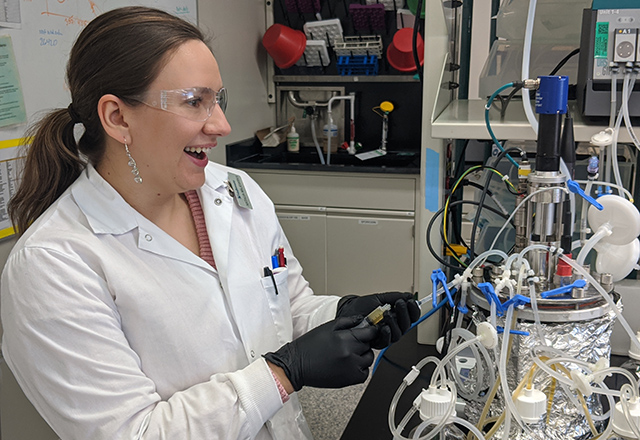Guest post by Ph.D. student Natalia Majewska.
I grabbed a lab coat and opened the door, revealing a modern laboratory space that rivaled a football field. All around me, I saw glass bioreactors with tubes extending through pumps and computer screens displaying various measurements. I was shocked that I would be conducting the majority of my research at these state-of-the-art facilities.
When I joined the Johns Hopkins-AstraZeneca Scholars Program in the spring of 2017, I didn’t know what to expect and felt the pressures of an hour-long commute between Gaithersburg and Baltimore and of leaving behind my Hopkins lab and friends. Now, almost two and a half years later, I am in the fourth year of my Ph.D. and incredibly grateful for the opportunities and experiences I have gained through this program.
Completing a Ph.D. at a biotechnology company has recently become more common through expanding industrial and academic collaborations. I always knew I wanted a career in industry, so I jumped at the opportunity to apply to join the inaugural Scholars class.
The first few months on-site at AstraZeneca challenged me to understand the company rules that everyone but me seemed to know. Endless online trainings, multiple winding lab spaces, pieces of equipment I could not even identify and new colleagues with years of experience. Would they even have time to show me around the labs and train me? After acclimating to spontaneous evening meetings at Hopkins, I had to get used to the rigor of respecting Outlook calendars and scheduling meetings weeks ahead of time.
In the lab, automated cell counters and access to multiple flow cytometers did not exclude me from experiencing many low points throughout my Ph.D. journey. When I first started working with bioreactors, I kept making mistakes that caused contaminations, wasting all the reagents I prepared and pushing my experiments back by weeks at a time. The worst part was not knowing exactly what I did wrong or what I could do to prevent it in the future.
Over time, I became more comfortable with the world of industry, and the countless acronyms and protocols became second nature. I realized that the experimental setbacks and doubting feelings are part of the process, and it felt like I was initiated into a group of scientists who are stronger now despite their failures.
I got to know my co-workers, scientists at various stages of their careers who have become mentors and friends. Learning to accept mistakes, finding a way to emotionally separate myself from experimental results, and sharing my doubts with others are skills I will take with me beyond graduate school.
No matter where you are, a Ph.D. is a marathon that makes you confront your insecurities and learn much more than just the science you were hoping is enough to get that first author publication.
The Johns Hopkins-AstraZeneca Scholars Program is a first-of-its-kind Ph.D. training program, in which students are introduced to the process and challenges of drug discovery and development through coursework in translational research and work conducted at AstraZeneca. This unique approach to training offers students hands-on experience in the biomedical field and prepares them for careers in the biopharma industry.
Natalia Majewska is a member of the 2017 inaugural class of the Johns Hopkins-AstraZeneca Scholar’s Program. She has been studying at Johns Hopkins for three and a half years.
Majewska’s project focuses on understanding changes to proteins that occur in a process called N-glycosylation. The changes are an essential part of biologic-based medicines and help make the body tolerant to such medicines. Without proper glycosylation, the body might see the medicine as foreign and quickly destroy it. With a better understanding of how this process works, researchers can optimize how often doses of drugs need to be given and how effective the drug is. This knowledge can accelerate the discovery of new drugs, making the process faster and more streamlined.
Her mentors are Michael Betenbaugh, professor of chemical and biomolecular engineering at The Johns Hopkins University, and Nitin Agarwal, principal scientist at AstraZeneca.
Related content
- Innovations at the Intersection of Medicine and Engineering
- Collaborations with Industry Strengthen Academic Research
Want to read more from the Johns Hopkins School of Medicine? Subscribe to the Biomedical Odyssey blog and receive new posts directly in your inbox.
